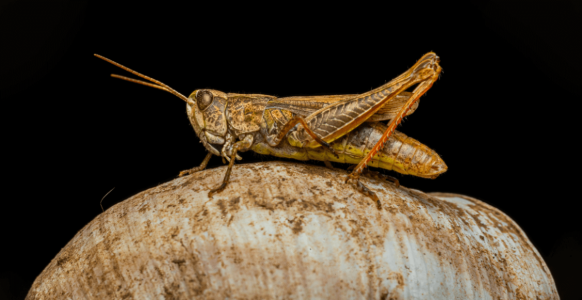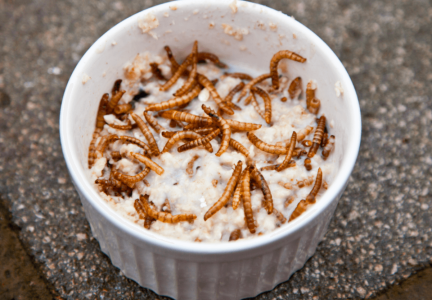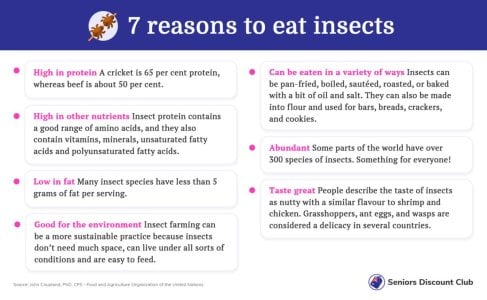Is This The Future of Food? Discover why insects could soon become a staple in your diet!
- Replies 7
Aussies are no strangers to dietary change — just look at the rise of plant-based diets and the growing awareness of the importance of cutting down on red meat.
But it looks like food technology is heading in an even more interesting direction – and that's using insects (yes, you read that correctly!) as a key part of our diets. Don't worry – we're not talking about munching on live ants or anything like that!
With the world's population expected to reach 10 billion within the next 30 years, there is mounting concern over how we can feed all these people in a way that is sustainable and won't compromise the environment.
As you may already know, the environmental impact of the agriculture and livestock industries is something that's been heavily debated in recent years.

As a possible solution, Professor Johannes le Coutre, a food and health expert from the University of New South Wales, has suggested that insects might be the answer to the looming challenge of feeding a rapidly expanding population.
'There are simply not enough cows on this planet to meet the projected food production demands,' Professor le Coutre explained. 'And we can't ignore the looming environmental challenges posed by the agriculture and the food industry.'
For some, the very notion of incorporating insects into your diet might have you reaching for the nearest can of Mortein. But fear not! Professor le Coutre assures that not every insect is fair game for the dinner table. 'Of course, not every insect is edible. There won't be any wasps or bees on the menu in 30 years, but you can bet there will be crickets, moths and beetles,' he said.
As it turns out, eating insects isn't as novel an idea as we might think. Many countries, such as Thailand, have been feasting on these little critters for centuries. In fact, Professor le Coutre compared the consumption of insects to eating shrimp – both are arthropods.
'Arthropods are basically lifeforms either on land or water that are surrounded by a chitin exoskeleton,' he explained. 'Most people won't cringe at the sight of a shrimp on their plate, but many might run if there was an insect crawling on the kitchen counter.'
Apart from insects, another viable protein alternative that has been steadily gaining traction is lab-grown or cultured meat. The industry is working on making this option more affordable and accessible to consumers, with further research needed to ensure it meets consumer expectations and can be manufactured at a reasonable cost.

Eating insects might not sound appealing at first, but there's actually more to it than meets the eye. According to John Coupland, a food science professor at Penn State University and a member of the Institute of Food Technologists, insects offer a sustainable and nutritious alternative source of protein that shouldn't be overlooked.
Did you know that crickets boast a whopping 65 per cent protein content, while beef lags behind at around 50 per cent? That's quite a difference! Insect protein is not only rich in amino acids, but it also contains vitamins, minerals, unsaturated fatty acids, and polyunsaturated fatty acids. It's a well-rounded package.
If you're watching your fat intake, insects have got you covered. Many insect species have less than 5 grams of fat per serving, which is impressive.
Insect farming is also a sustainable practice. These little critters don't require much space, can adapt to various conditions, and are easy to feed. It's a win-win for our planet.
You'd be surprised by the range of ways you can enjoy insects. Pan-fried, boiled, sautéed, roasted, or baked with a touch of oil and salt—the possibilities are endless. They can also be ground into flour and used to make bars, breads, crackers, and even cookies. Talk about versatility!
Certain parts of the world are home to over 300 species of insects. With such variety, there's something to suit every palate. When it comes to taste, insects have their own unique charm. People often describe their flavour as nutty, with hints of shrimp and chicken. In fact, grasshoppers, ant eggs, and wasps are considered delicacies in many countries.
So, while the idea of munching on insects might seem strange, it's worth considering the nutritional benefits and the positive impact it can have on our environment. Who knows, you might discover a new favourite snack!
So, members, what are your thoughts on this potentially buzzy trend? Would you be willing to try insects as part of your meal plan? Or will you be sticking to traditional meat and plant-based options? Share your thoughts with us in the comments section below – we'd love to hear from you!
But it looks like food technology is heading in an even more interesting direction – and that's using insects (yes, you read that correctly!) as a key part of our diets. Don't worry – we're not talking about munching on live ants or anything like that!
With the world's population expected to reach 10 billion within the next 30 years, there is mounting concern over how we can feed all these people in a way that is sustainable and won't compromise the environment.
As you may already know, the environmental impact of the agriculture and livestock industries is something that's been heavily debated in recent years.

Insects are on the menu as the global population grows, a UNSW professor says. Credit: Unsplash/artiis.
As a possible solution, Professor Johannes le Coutre, a food and health expert from the University of New South Wales, has suggested that insects might be the answer to the looming challenge of feeding a rapidly expanding population.
'There are simply not enough cows on this planet to meet the projected food production demands,' Professor le Coutre explained. 'And we can't ignore the looming environmental challenges posed by the agriculture and the food industry.'
For some, the very notion of incorporating insects into your diet might have you reaching for the nearest can of Mortein. But fear not! Professor le Coutre assures that not every insect is fair game for the dinner table. 'Of course, not every insect is edible. There won't be any wasps or bees on the menu in 30 years, but you can bet there will be crickets, moths and beetles,' he said.
As it turns out, eating insects isn't as novel an idea as we might think. Many countries, such as Thailand, have been feasting on these little critters for centuries. In fact, Professor le Coutre compared the consumption of insects to eating shrimp – both are arthropods.
'Arthropods are basically lifeforms either on land or water that are surrounded by a chitin exoskeleton,' he explained. 'Most people won't cringe at the sight of a shrimp on their plate, but many might run if there was an insect crawling on the kitchen counter.'
Apart from insects, another viable protein alternative that has been steadily gaining traction is lab-grown or cultured meat. The industry is working on making this option more affordable and accessible to consumers, with further research needed to ensure it meets consumer expectations and can be manufactured at a reasonable cost.
Key Takeaways
- Aussies may need to incorporate insects like crickets, moths, and beetles into their diets by 2050 due to an increasing global population and food insecurity.
- University of NSW food and health expert Professor Johannes le Coutre says that insects can be a sustainable source of protein as traditional agriculture struggles to meet future demands.
- Eating insects is already common in countries like Thailand, and biologically, it is similar to eating shrimp, which are both arthropods.
- Another expected protein alternative is cultured or lab-grown meat, which requires further research to ensure it meets consumer expectations and affordability.
Eating insects might not sound appealing at first, but there's actually more to it than meets the eye. According to John Coupland, a food science professor at Penn State University and a member of the Institute of Food Technologists, insects offer a sustainable and nutritious alternative source of protein that shouldn't be overlooked.
Did you know that crickets boast a whopping 65 per cent protein content, while beef lags behind at around 50 per cent? That's quite a difference! Insect protein is not only rich in amino acids, but it also contains vitamins, minerals, unsaturated fatty acids, and polyunsaturated fatty acids. It's a well-rounded package.
If you're watching your fat intake, insects have got you covered. Many insect species have less than 5 grams of fat per serving, which is impressive.
Insect farming is also a sustainable practice. These little critters don't require much space, can adapt to various conditions, and are easy to feed. It's a win-win for our planet.
You'd be surprised by the range of ways you can enjoy insects. Pan-fried, boiled, sautéed, roasted, or baked with a touch of oil and salt—the possibilities are endless. They can also be ground into flour and used to make bars, breads, crackers, and even cookies. Talk about versatility!
Certain parts of the world are home to over 300 species of insects. With such variety, there's something to suit every palate. When it comes to taste, insects have their own unique charm. People often describe their flavour as nutty, with hints of shrimp and chicken. In fact, grasshoppers, ant eggs, and wasps are considered delicacies in many countries.
So, while the idea of munching on insects might seem strange, it's worth considering the nutritional benefits and the positive impact it can have on our environment. Who knows, you might discover a new favourite snack!
So, members, what are your thoughts on this potentially buzzy trend? Would you be willing to try insects as part of your meal plan? Or will you be sticking to traditional meat and plant-based options? Share your thoughts with us in the comments section below – we'd love to hear from you!









